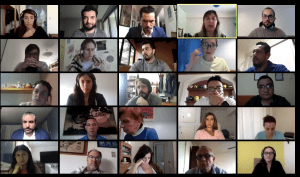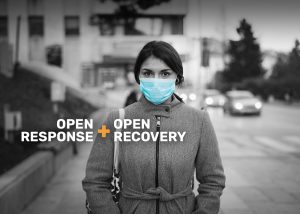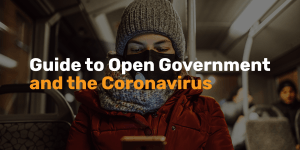An Open Government Approach to Facing the Pandemic in Latin America: What We Heard
Enfrentando la pandemia en Latinoamérica desde la óptica de gobierno abierto: Lo que escuchamos
As part of the regional discussions around the Open Response + Open Recovery, the Latin American community got together a month ago, convinced that the solutions to the pandemic must rely on openness, and exploring ways to better articulate our efforts at the national and regional levels.
In the context of the challenges that this unprecedented emergency poses, governments, civil society, academia, international organizations and citizens alike wonder: How can we coordinate our work at the national and regional levels? How can we leverage OGP’s resources and spaces (forums, commitments, boards) that we have developed over the years as a community to determine what we need to do today to face the crisis and its impacts over the short, medium and long terms?

Following an analysis of the discussions of seven working groups, and in an effort to let this input continue to guide our approach to support response efforts and potential future dialogue, we would like to highlight the following key messages:
OGP’s Role in the Pandemic
The recommendation is clear: OGP, as a platform, must provide the necessary flexibility to let countries address their most pressing needs. But, at the same time, many questions arise about how to do just that. Various forums posed questions around how to leverage the spaces we already have, what the role of the multi-stakeholder forums can be, how to turn these demands into concrete answers, and how to account for our work. We identified the challenge of how to strengthen the collaboration and articulation of the regional open government community to coordinate strategies and enhance our work.
In this context, many countries are taking on the challenge to co-create their action plans and specific commitments online. Recently, OGP launched a series of online tools to take the co-creation process online. We will work with Democracia en Red to adapt some of these resources to the Latin American context, and we expect to publish the results over the coming months. We will also continue to foster the conversation to explore ways to articulate our efforts.
Recommendations about Specific Policy Areas
It has become clear that there is a complete rejection to any and all measures that cut down on the right to access to information or shrink the civic space over the short and long terms, as well as any attempt to limit accountability mechanisms. As the conversation highlighted, transparencyAccording to OGP’s Articles of Governance, transparency occurs when “government-held information (including on activities and decisions) is open, comprehensive, timely, freely available to the pub... More and accountability cannot be put on lockdown. We also shared a great concern about the need to focus our response efforts in the most vulnerable groups and the importance of including these groups in the response efforts, with an inclusionOGP participating governments are working to create governments that truly serve all people. Commitments in this area may address persons with disabilities, women and girls, lesbian, gay, bisexual, tr... More and participatory approach. Besides, there is a widespread concern for the future of civil society financing.
Unsurprisingly, we received countless proposals. As part of our response efforts, we must identify the thematic areas that are being addressed by the community, as well as those that have been unattended. For instance, many showed concern around transparency of emergency procurement. This will be critical during the response and recovery efforts, and organizations such as the Open Contracting Partnership are creating spaces to discuss and face challenges. We will continue to work over the coming months to channel these demands into the corresponding collaboration efforts and, whenever necessary, we will create additional spaces.
Lastly, all of our conversations highlighted the need to identify and share best practices (some of which have already been collected) to face the crisis. We need to remember that the capacities already installed when the crisis started have largely determined our options for transparency, accountability and citizen engagement. In other words, openness investments over the medium and short terms are key during challenging times. For instance, Paraguay’s progress on public contracting allowed for the quick adoption of open dataBy opening up data and making it sharable and reusable, governments can enable informed debate, better decision making, and the development of innovative new services. Technical specifications: Polici... portals for transparency of the emergency procurement. Thus, sustainable policies are key, not only to adjust our practices and institutions permanently, but also to develop protocols to respond when crises arise.
Best Practices
The Guide to Open Government and the Coronavirus, published by OGP and open government partners, is a starting point to map what countries are doing. The guide contains recommendations and resources around 13 thematic areas, including civic space, open data, inclusion and genderOGP participating governments are bringing gender perspectives to popular policy areas, ensuring diversity in participatory processes, and specifically targeting gender gaps in policies to address gov... More, and fiscal policy, among others. Due to the public interest this guide has sparked, OGP will continue to provide opportunities and platforms for peer exchange and learning.
Naturally, the conversation does not end there. If you identify any topic we failed to mention here but that was highlighted during our discussions, please comment at the end of this text. Over the coming months, we will continue the conversations and calls, first in smaller groups to allow for deeper analyses and specific proposals, and more broadly later on. The current context is very complex; thus, we need to leverage all the resources the Latin American open government community has to ensure that our responses follow the openness principles.
Como parte de las conversaciones regionales de Respuesta Abierta + Recuperación Abierta, hace un mes nos reunimos como comunidad latinoamericana con la convicción de que las respuestas a la pandemia tienen que tener un enfoque de apertura, explorando la forma de articularnos mejor a nivel nacional y regional.
Ante los desafíos que nos presenta esta emergencia sin precedentes, representantes de gobierno, sociedad civil, academia, organismos internacionales y ciudadanía nos preguntamos ¿Cómo nos podemos organizar a nivel nacional y regional? ¿Cómo aprovechamos los recursos o espacios de OGP (foro, compromisos, mesas) que hemos desarrollado a lo largo de estos años como comunidad para definir qué tenemos que hacer hoy para enfrentar la crisis y sus efectos a corto, mediano y largo plazo?

Tras analizar los resúmenes de las discusiones que siguieron en siete grupos de trabajo y con el objetivo de que este insumo continúe guiando nuestra estrategia para apoyar los diferentes esfuerzos de respuesta y posibles diálogos futuros, esto fue lo que escuchamos:
El papel de OGP en la pandemia
Las propuestas son claras: OGP como plataforma debe proveer la flexibilidad necesaria para responder a temas urgentes. Pero al mismo tiempo surgen muchos interrogantes sobre cómo hacerlo. En diferentes mesas se generaron preguntas relativas a cómo usar los espacios que ya tenemos, cuál es el papel de los foros multiactor, cómo articular las demandas en esos espacios, cómo convertir estas demandas en propuestas concretas y cómo rendir cuentas sobre nuestro trabajo. También apareció el reto de cómo fortalecer la colaboración y articulación de la comunidad de gobierno abierto regional para coordinar estrategias y potenciar nuestro trabajo.
En este contexto, muchos países están asumiendo el desafío de cocrear sus planes de acción o compromisos específicos de forma virtual. Recientemente, OGP lanzó una Guía de herramientas online para llevar a cabo la cocreación. También trabajaremos con Democracia en Red para adaptar algunos de estos recursos al contexto latinoamericano y esperamos publicar los resultados de este trabajo en los siguientes meses. Asimismo continuaremos el diálogo para seguir explorando formas de articular esfuerzos.
Propuestas sobre áreas de trabajo específicas
Es claro que hay un completo rechazo a cualquier medida que reduzca el derecho de acceso a la información o restrinja el espacio cívico en el corto y largo plazo, así como cualquier intento de limitar mecanismos establecidos para la rendición de cuentas. Como sugirieron en el diálogo, la transparencia y rendición de cuentas no pueden ponerse en cuarentena. También compartimos una gran preocupación sobre la importancia de hacer frente a la crisis sanitaria en los sectores más vulnerables y la necesidad de involucrar a estos grupos en la respuesta, con un enfoque de inclusión y participación. A su vez, cabe destacar la preocupación generalizada por el futuro financiamiento de la sociedad civil.
No sorprende que hayamos recibido un sinnúmero de propuestas. Como parte de nuestra respuesta, debemos identificar aquellos temas que están siendo atendidos por la comunidad y aquéllos que faltan. Por ejemplo, un tema que muchas personas mencionaron es la preocupación por la transparencia en compras de emergencia. Este será un eje de gran importancia en la respuesta y recuperación de COVID-19 y organizaciones como la Alianza para las Contrataciones Abiertas están desarrollando espacios para dialogar y enfrentar retos. En los siguientes meses continuaremos trabajando con la comunidad para canalizar las demandas en los espacios adecuados de colaboración y, cuando sea necesario, generar espacios adicionales.
Mejores prácticas
Por último, fue notorio en todas las conversaciones el deseo de conocer y compartir mejores prácticas (como algunas ya recopiladas) para enfrentar la crisis. Debemos recordar que la capacidad instalada al momento de iniciar la crisis determina en gran medida las opciones que se tienen para transparentar, rendir cuentas e involucrar a la ciudadanía en la respuesta. Es decir, las inversiones en materia de apertura de mediano y largo plazo son clave para poder responder mejor en contextos críticos. Los avances logrados en materia de contrataciones públicas en el caso de Paraguay, por ejemplo, permitieron una rápida adaptación de sus portales de publicación de datos para transparentar las compras en emergencia. En ese sentido, pensar en políticas sostenibles se vuelve clave, no solo para ajustar nuestras prácticas e instituciones de modo permanente, pero también para desarrollar protocolos para dar respuesta a situaciones de crisis puntuales.
Un punto de partida para conocer qué están haciendo otros países puede ser la Guía de Gobierno Abierto y Coronavirus que OGP elaboró en colaboración con colegas de la comunidad de gobierno abierto global. La guía contiene recomendaciones y recursos sobre 13 áreas temáticas que incluyen espacio cívico, datos abiertos, inclusión y género y política fiscal, entre otros. En vista del interés que despertó este tema, OGP seguirá ofreciendo oportunidades y plataformas para intercambiar experiencias y aprendizajes.
La conversación, obviamente, no termina aquí. Si hay algún tema clave que no mencionamos pero que discutimos en el diálogo, por favor incluirlo como comentario al final de este texto. Por nuestra parte, durante los siguientes meses continuaremos los diálogos y las convocatorias, primero en grupos más pequeños que nos permitan analizar a profundidad los temas y generar propuestas específicas, y luego de modo ampliado. El contexto es que vivimos es muy complicado, por ello es clave usar todos los recursos que tenemos como comunidad de gobierno abierto latinoamericana para garantizar respuestas que sigan los principios de apertura.
No comments yet
Related Content

Open Response + Open Recovery
Our community’s fundamental values of accountability, transparency, inclusivity, and responsiveness are vital as we move through COVID-19 response to recovery. Find resources, events and examples from OGP and partners.

A Guide to Open Government and the Coronavirus
This guide is a one-stop shop for the best current resources on how open government projects and approaches can support tackling the pandemic.

Open Response + Open Recovery Digital Forum
Join the OGP community for virtual conversations about open government responses to the coronavirus pandemic and how to move towards open and effective recovery efforts.


Leave a Reply